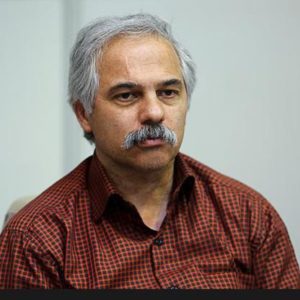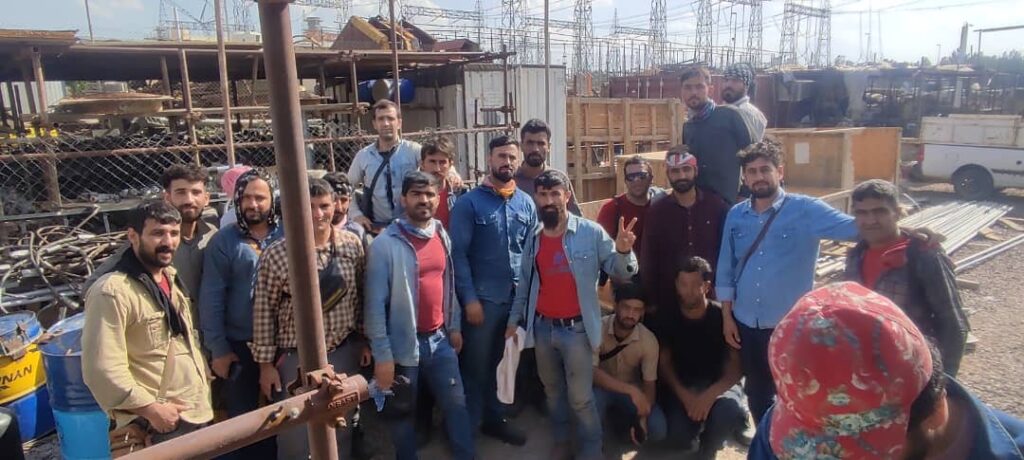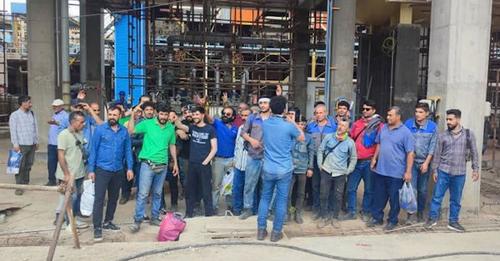
Maziar Gilaninejad talks about the critical situation in workplaces in Iran; labour protests in the country; and the unresponsiveness and questionable performance of the authorities and managers of factories and projects across Iran.
Abridged and translated from AndisheNou
What is the background of the current project workers’ strike in the oil, gas, and petrochemical sector in Iran?
MG- The horrendous working conditions in the oil fields and projects; non-compliance with labour laws and the distinct lack of protection for workers in this field; and the absence of any organisation through which workers could seek redress, prompted the union leadership of the Union of Metalworkers and Mechanics of Iran (UMMI) to begin engaging with these workers in 2016. In July 2018, a gathering of project workers was organised at Asaluyeh, which was fiercely repressed by the authorities and several union activists were arrested.
Learning from this setback, a new organisation was formed with an emphasis on training in trade union activism. This led to the formation of a core group of 35 project worker activists and the launching of a campaign for sustained industrial action in 2020. In total 45,000 workers joined this strike and within two months, all wage arrears were settled, and salaries were doubled.
In 2021, workers again moved to strike for a 40% increase in their wages and a “20:10” working pattern (whereby workers would be on shift for 20 days followed by 10 days of leave per month). In total 125,000 project workers from the oil, gas, and power plant sector took part in this industrial action, which was the largest and most widespread strike since the 1979 Revolution.
Following another major strike action in 2022, involving 65,000 workers, an agreement was reached with the contractors and local management for implementation of the “20:10” working pattern, an eight-hour workday, and overtime pay. The agreement also covered timely payment of wages, a wage increase, correct insurance cover, improved accommodation and canteen facilities, air-conditioned transport, and the provision of services for proper hygiene and sanitation, all in line with Oil Ministry standards.
In 2023, workers continued to push for the full implementation of the “20:10” pattern as well as a 79% wage increase owing to skyrocketing levels of inflation, the plummeting in value of the national currency, and the exorbitant costs of basic living.

Earlier this year, the union pushed further for a proper wage increase, but contractors opposed the demand. The union again called for the elimination of contractors from the employment relationship in the oil and gas sector and articulated its demands for a “14:14” working pattern more suitable for those labouring under the conditions typical in the sector. 21 June saw the beginning of the current wave of sustained industrial action.
How prevalent are contractor agreements in this industry and what obstacles do they pose for workers and trade union activities?
MG- Unfortunately, temporary contracts have become a plague for all Iranian workers, especially project workers in the oil, gas, and petrochemical sector. Today, less than 3% of workers are directly or officially employed, mostly in high-ranking and specialist positions or as office clerks. Thus, workers have no sense of job security.
Ultimately, the contractors act to disrupt and break the interface between the employer (the Oil Company) and the workers – most of whom are often engaged on specialist and technical tasks requiring a specific skillset. This means that these workers are precluded from the pay, benefits, and terms and conditions afforded to their official directly employed counterparts. Thus, they constitute a separate lower tier among the workforce despite their skills and the tasks they are required to undertake.
However, there is a flipside to this. The lack of regulation can sometimes mean that project workers have more scope to push their demands, particularly when they are organised and acting in concert, e.g. by refusing to report back or resume their duties at their next shift after taking leave, as they are not contractually obliged to do so.
What is the relationship between these contractors and government institutions and can workers deal with them through these channels to obtain their union rights?
MG- Small-scale contractors do not have significant connections within the oil mafia, but their parent companies undoubtedly do. They secure billion-dollar profits through tenders. In turn, the oil mafia takes advantage of its links with the judiciary and the state. We have a case still pending, after legal experts from the Labour Ministry were denied access to one of the petrochemical sites. Bureaucratic red tape often also discourages workers from filing complaints.

Can you please explain the practical experiences gained from workers’ strikes in improving working and material conditions?
MG- One of the significant achievements has been the creation of more effective communication channels. Today, our name (the UMMI) is familiar to most workers, and we are referred to as the “Workers’ Union”. Another experience we have gained is the utilising of certain common market practices, especially in relation to project workers in the oil and gas industry in the south. For example, without physical confrontation, simply by leaving the workplace, we have rammed home the message to employers that no project can be completed without skilled labour. Another of our achievements is in the disseminating of project news and contractor violations through social media platforms at no additional cost.
Through the persistent efforts of the union we have witnessed a significant improvement in working conditions, particularly in the oil and gas industry. A notable increase of 2000 percent in average welders’ wages; significant improvements in amenities such as food, sanitation, and accommodation; and an increase in monthly leave from 10 to 14 days are among the major fruits of these efforts. However, challenges such as the non-compliance of certain facilities with Oil Company standards and the need to improve job security still persist.
What methods were used to deal with the employers’ strike-breaking actions and how successful was it?
MG- Workers’ outright refusal to work for certain contractors have proven to be one of the most effective tools for workers to counter the anti-strike actions of those contractors attempting to resist changes. However, contractors employ various methods to frustrate this approach, such as changing the name of their companies or appointing their family members as front managers to hide their anti-worker records. These tactics are soon uncovered and laid bare. Of course, the conscientiousness of a jobless worker in refusing to man the post of a striking brother also counts among our strengths as one of the most effective ways of fighting the strike-breaking contractors.
Has the UMMI been in contact with trade unions in other countries of the world regarding the current “14:14” campaign? And how can they help this campaign?
MG-
UMMI has been for a decade a full member of the IndustriALL Global Union. As in all other industrial actions we have organised during this period we have been supported by IndustriALL and all its affiliates, small and large trade unions operating in the same field from across the world. In the past two months we have received constant support from the leadership of IndustriALL, the Metalworkers of Sweden, and unions from Canada, Denmark, India, France, Australia. In Britain there were solidarity actions from GFTU and RMT. Their support is a great encouragement for us. At the moment, it is enough for us to know that our counterparts internationally are aware of our struggle, its aims, and the fraught conditions in which it is being waged. That we do not stand alone! The growing international awareness of our struggle is a source of great motivation and pride for us.
Note: This interview is published in Iran Today, the bulletin of CODIR, Autumn 2024 issue and will be distributed at the TUC congress in Brighton.












 Posted in
Posted in 











